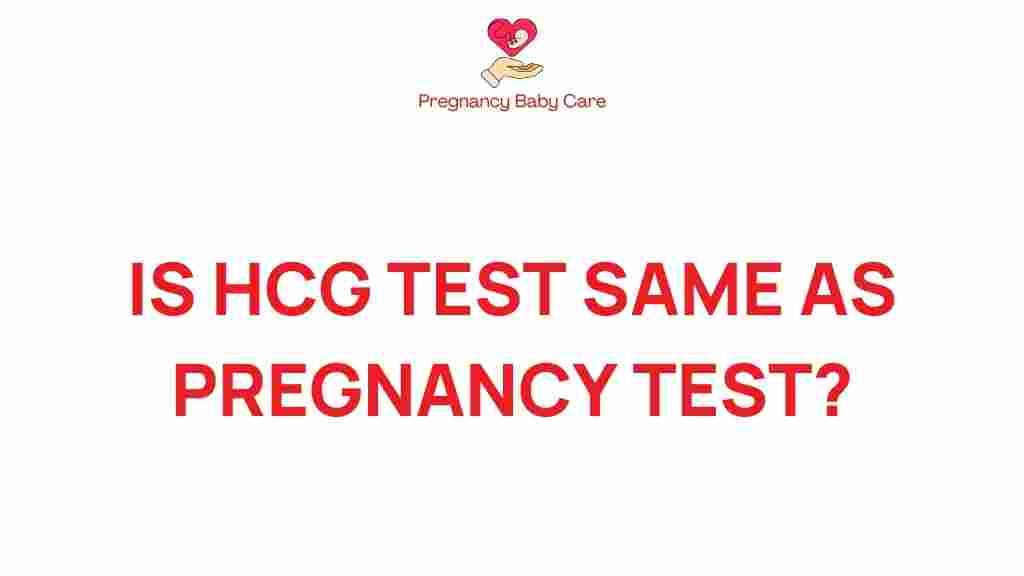Unveiling the Truth: Is the HCG Test the Same as a Pregnancy Test?
When it comes to understanding women’s health, two terms often come up in conversations around fertility and pregnancy detection: the HCG test and the pregnancy test. Many individuals, especially those trying to conceive, may wonder if these two tests are the same or if they serve different purposes. This article will delve into the details, shedding light on hormone levels, the significance of HCG, and how these medical tests relate to each other.
Understanding HCG and Pregnancy Tests
The HCG test and the pregnancy test are closely related, but they are not identical. Both tests measure the hormone human chorionic gonadotropin (HCG), which plays a crucial role in early pregnancy. However, the context in which these tests are used can differ significantly.
What is the HCG Test?
The HCG test specifically measures the level of human chorionic gonadotropin in the blood or urine. HCG is a hormone produced by the placenta shortly after a fertilized egg attaches to the uterine lining. This hormone is vital for maintaining pregnancy and is one of the earliest indicators of pregnancy.
What is a Pregnancy Test?
A pregnancy test, on the other hand, is a broader term that typically refers to any test used to determine if a woman is pregnant. Most pregnancy tests are designed to detect HCG levels, but they may vary in sensitivity and accuracy. There are two primary types of pregnancy tests:
- Urine Pregnancy Tests: These are the most common and can be done at home. They detect the presence of HCG in urine.
- Blood Pregnancy Tests: These are conducted in a medical facility and can measure the exact level of HCG in the bloodstream.
The Role of HCG in Pregnancy Detection
HCG levels begin to rise shortly after conception, making it a reliable marker for early pregnancy detection. Here’s how it works:
- Fertilization: Once the sperm fertilizes the egg, the embryo begins to develop.
- Implantation: About 6-10 days after fertilization, the embryo implants itself into the uterine lining, leading to the production of HCG.
- Testing: Most home pregnancy tests can detect HCG about a week after a missed period, while blood tests can detect it even earlier.
Key Differences Between HCG Tests and Pregnancy Tests
While both tests measure HCG levels, understanding their differences can help individuals make informed decisions regarding their healthcare:
- Purpose: The HCG test is often used to monitor fertility treatments or confirm pregnancy, while pregnancy tests are primarily for confirming pregnancy.
- Method: HCG tests can be quantitative (measuring exact levels) or qualitative (positive or negative), while most home pregnancy tests are qualitative.
- Timing: Blood tests can detect pregnancy earlier than urine tests due to HCG concentration in the blood.
When to Take an HCG or Pregnancy Test
Timing is critical when it comes to testing for pregnancy. Here are some guidelines:
- Home Pregnancy Tests: Best taken after a missed period for accurate results.
- Blood Tests: Can be performed as early as 6-8 days post-ovulation.
Step-by-Step Process of Taking a Pregnancy Test
Taking a pregnancy test can be straightforward. Here’s a step-by-step guide:
1. Gather Your Supplies
For a home urine pregnancy test, you will need:
- A home pregnancy test kit
- A timer
- A clean, dry container (if needed)
2. Choose the Right Time
It’s best to take the test in the morning when your urine is most concentrated. This increases the chances of detecting HCG levels accurately.
3. Follow the Instructions
Each test may have slightly different instructions, but generally, you will:
- Urinate directly onto the test strip or into a cup and dip the strip.
- Wait for the recommended time, usually a few minutes.
4. Read the Results
Interpret the results based on the test’s instructions. A positive result usually shows two lines or a plus sign, while a negative result shows one line or a minus sign.
5. Follow Up with a Healthcare Provider
If you receive a positive result or have any concerns, schedule an appointment with your healthcare provider for further testing and confirmation.
Troubleshooting Common Issues with HCG and Pregnancy Tests
While pregnancy tests are generally reliable, there are several factors that can affect their accuracy:
1. Timing of the Test
Testing too early can lead to false negatives. If you suspect you are pregnant, wait a few days after a missed period for the most accurate results.
2. Dilution of Urine
Consuming large amounts of fluids before taking a test can dilute your urine, potentially leading to inaccurate results.
3. User Error
Not following the instructions carefully can result in incorrect readings. Always read and follow the instructions included with the test.
4. Expired Tests
Make sure your pregnancy test is not expired, as this can affect its efficacy.
Importance of HCG Level Monitoring in Women’s Health
Monitoring HCG levels can be critical for various reasons:
- Early Pregnancy Confirmation: Helps confirm pregnancy and establish gestational age.
- Monitoring Fertility Treatments: Assists in tracking the success of fertility treatments.
- Detecting Complications: Abnormal HCG levels can indicate potential complications, such as ectopic pregnancy or miscarriage.
Conclusion
In conclusion, while the HCG test and pregnancy test are closely related, they serve different purposes in the realm of women’s health. Understanding the differences between these medical tests can help individuals make informed decisions regarding fertility and pregnancy detection. Always consult with a healthcare provider for personalized advice and follow-up testing.
If you’re looking for more information on women’s health, consider visiting this resource. For further understanding of HCG and its role in fertility, check out this article.
This article is in the category Health and created by PregnancyBabyCare Team
